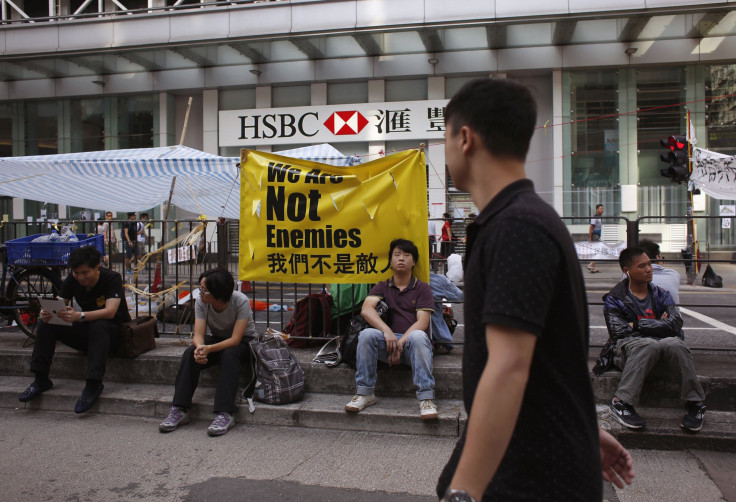Hong Kong Protests: Talks Or Not, Beijing Still Has A Problem

As Hong Kong's student-run protests entered their second week Monday, the number of demonstrators began to drop amid flagging enthusiasm for the pro-democracy movement. Meanwhile, a major Hong Kong student group agreed to meet with government representatives no later than next Sunday to attempt to end the political crisis rocking the Chinese-ruled territory. Student leaders called the talks a strategic retreat rather than a surrender to the government.
"This is definitely not the end," said Alex Chow, whose group, the Hong Kong Federation of Students, will participate in the meeting. "We've never set a timeframe for how long this should go on."
But even if the talks manage to resolve the immediate differences between the two sides, discussion of the underlying issues that sparked the crisis is unlikely to occur -- and that may be a problem for the Chinese government, with younger Hong Kongers increasingly dissatisfied with Beijing's rule.
The talks will focus on the specific demands of the protesters: the resignation of Leung Chun-yin, Hong Kong's chief executive, and the repeal of a new electoral law limiting eligibility for the territory's 2017 chief executive election to candidates vetted by China. Neither the Hong Kong government nor the Chinese Communist Party have indicated they will agree to these demands, and both have threatened the protesters with severe consequences if they fail to halt their occupation.
Yet the larger issue of the status of Hong Kong -- long defined by Beijing's slogan "one country, two systems" -- is not on the table. Since taking over the territory in 1997 and agreeing to leave its political, legal and economic systems intact for 50 years, China has repeatedly been suspected by Hong Kongers of trying to step around that pledge. In 2003, Beijing's new "national security law" elicited widespread protests throughout the territory; a 2012 attempt to impose "patriotic education" standards in Hong Kong caused such intense opposition, the proposal was scrapped. These intrusions have contributed to a generation gap in Hong Kong where the territory's youngest residents identify less as Chinese.
"The problem doesn't go away for Beijing," Crane said. "You still have mobilized youth who are now clearer about what the distinction politically is between Hong Kong and the mainland, and how that has to be defended."
For now, though, protesters are contending with a growing sense of fatigue from the public at large. Hong Kong residents opposed to the demonstrations Friday clashed with protesters in Mong Kok, a working-class neighborhood in the Kowloon district, delaying initial talks. And during the weekend, a man threatened to jump from a bridge if the protests didn't stop.
"As long as people stay out on the street, time is on the government's side," said Sam Crane, a professor of Chinese history at Williams College in Massachusetts. "I think a strategic pullback on the part of the demonstrators is a smart move."
This pushback has informed the students' position prior to the meetings -- and that includes negotiating with the government. Although Leung has refused to step down, he has also dispatched the territory's top civil servant, Carrie Lam, to conduct the negotiations.
"The students no longer trust Leung Chun-yin's leadership," said Joseph Lee, a professor of history at Pace University in New York. "But they're also going to avoid asking for unrealistic concessions from either the Hong Kong or Chinese governments."
© Copyright IBTimes 2024. All rights reserved.






















